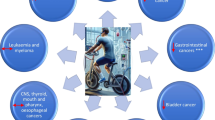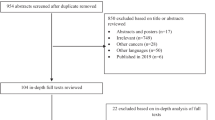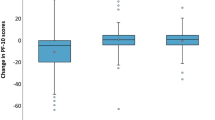Abstract
Background
Excess weight is a strong predictor of incident breast cancer (BC) and survivorship. A limited number of studies comparing strategies for promoting successful weight loss in women with remitted BC exist.
Purpose
CASTLE was a pilot study comparing the effectiveness/feasibility of in-person and telephonic behavioral-based lifestyle weight loss interventions in BC survivors.
Method
Fifty-two overweight/obese women (BMI = 25–45 kg/m2) with remitted BC (stages I–IIIa) who recently completed cancer treatment were assigned to either an in-person group (n = 24) or an individual telephone-based condition (n = 11). Both interventions focused on increasing physical activity and reducing caloric intake. The phase I intervention lasted 6 months. The in-person condition received 16 group-based sessions, and the telephone condition received intervention calls approximately weekly. Phase II lasted 6 months (e.g., months 6–12), and all participants received monthly intervention calls via telephone.
Results
Participants were predominately Caucasian (80 %) with a mean age of 52.8 (8.0) years and BMI of 31.9 (5.4) kg/m2. Mixed models ANOVAs showed significant within group weight loss after 6 months for both the in-person (−3.3 kg ± 4.4, p = 0.002) and the telephonic (−4.0 kg ± 6.0, p = 0.01) conditions with no between group differences. During phase II, the in-person group demonstrated significant weight regain (1.3 kg ± 1.7, p = 0.009).
Conclusion
Our pilot study findings demonstrated that telephone-based behavioral weight loss programs are effective and feasible in BC survivors and that telephonic programs may have advantages in promoting weight loss maintenance.



Similar content being viewed by others
References
U.S. Cancer Statistics Working Group. United States Cancer Statistics: 1999–2006 Incidence and Mortality Web-based Report. Atlanta: U.S. Department of Health and Human Services, Centers for Disease Control and Prevention and National Cancer Institute; 2010. Available at: www.cdc.gov/uscs.
Altekruse SF, Kosary CL, Krapcho M, Neyman N, Aminou R, Waldron W, et al. (eds). SEER Cancer Statistics Review, 1975–2007. Bethesda: National Cancer Institute. http://seer.cancer.gov/csr/1975_2007/, based on November 2009 SEER data submission, posted to the SEER web site; 2010.
Herrero F, San Juan AF, Fleck SJ, Balmer J, Pérez M, Cañete S. Combined aerobic and resistance training in breast cancer survivors: a randomized, controlled pilot trial. Int J Sports Med. 2006;27(7):573–80.
Courneya KS, Mackey JR, Bell GJ, Jones LW, Field CJ, Fairey AS. Randomized controlled trial of exercise training in postmenopausal breast cancer survivors: cardiopulmonary and quality of life outcomes. J Clin Oncol. 2003;21(9):1660–8.
Sternfeld B, Weltzien E, Quesenberry Jr CP, Castillo AL, Kwan M, Slattery ML, et al. Physical activity and risk of recurrence and mortality in breast cancer survivors: findings from the LACE study. Cancer Epidemiol Biomarkers Prev. 2009;18(1):87–95.
Irwin ML, McTiernan A, Bernstein L, Gilliland FD, Baumgartner R, Baumgartner K, et al. Physical activity levels among breast cancer survivors. Med Sci Sports Exerc. 2004;36(9):1484–91.
Herman DR, Ganz PA, Petersen L, Greendale GA. Obesity and cardiovascular risk factors in younger breast cancer survivors: the Cancer and Menopause Study (CAMS). Breast Cancer Res Treat. 2005;93:13–23.
Mefferd K, Nichols JF, Pakiz B, Rock CL. A cognitive behavioral therapy intervention to promote weight loss improves body composition and blood lipid profiles among overweight breast cancer survivors. Breast Cancer Res Treat. 2007;104:145–52.
Morey MC, Snyder DC, Sloane R, Cohen HJ, Peterson B, Hartman TJ, et al. Effects of home-based diet and exercise on functional outcomes among older, overweight long- term cancer survivors. RENEW: a randomized controlled trial. JAMA. 2009;301(18):1883–91.
Foster-Schubert KE, Alfano CM, Duggan CR, Xiao L, Campbell KL, Kong A, et al. Effect of diet and exercise, alone or combined, on weight and body composition in overweight-to-obese postmenopausal women. Obesity 2012. doi:10.1038/oby.2011.76.
DiClemente CC, Prochaska JO, Fairhurst SK, Velicer WF, Velasquez MM, Rossi JS. The process of smoking cessation: an analysis of precontemplation, contemplation, and preparation stages of change. J Consult Clin Psychol. 1991;59(2):295–304.
Miller W, Rollinick S. Motivational interviewing: preparing people to change addictive behavior. New York: Guilfor; 2002.
West DS, DiLillo V, Bursac Z, Gore SA, Greene PG. Motivational interviewing improves weight loss in women with type 2 diabetes. Diabetes Care. 2007;30(5):1081–7.
Goldberg JH, Kiernan M. Innovative techniques to address retention in a behavioral weight-loss trial. Health Educ Res. 2005;20(4):439–47.
Digenio AG, Mancuso JP, Gerber RA, Dvorak RV. Comparison of methods of delivering a lifestyle modification program for obese patients. A randomized trial. Ann Intern Med. 2009;150:255–62.
Hellerstedt WL, Jeffery RW. The effects of a telephone-based intervention on weight loss. Am J Health Promot. 1997;11:177–82.
Sherwood NE, Jeffery RW, Pronk NP, Boucher JL, Hanson A, Boyle R, et al. Mail and phone interventions for weight loss in a managed-care setting: weigh-to-be 2-year outcomes. Int J Obes. 2006;30:1565–73.
Linstrom LL, Balch P, Reese S. In person versus telephone treatment for obesity. J Behav Ther Exp Psychiatr. 1976;7:367–9.
Tsai AG, Wadden TA. Systematic review: an evaluation of major commercial weight loss programs in the United States. Ann Intern Med. 2005;142:56–66.
Djuric Z, DiLaura NM, Jenkins I, Darga L, Jen CKL, Mood D, et al. Combining weight-loss counseling with the Weight Watchers plan for obese breast cancer survivors. Obes Res. 2002;10:657–65.
Knowler WC, Barrett-Connor E, Fowler SE, Hamman RF, Lachin JM, Walker EA, et al. Reduction in the incidence of type 2 diabetes with lifestyle intervention or metformin. N Engl J Med. 2002;346(6):393–403.
SAS Institute. The SAS system: SAS OnlineDoc®, Version 9.1, HTML format [CD-ROM]. Cary: SAS Institute; 2000.
Stevens VJ, Obarzanek E, Cook NR, Lee IM, Appel LJ, Smith West D, et al. Long-term weight loss and changes in blood pressure: results of the Trials of Hypertension Prevention, phase II. Ann Intern Med. 2001;134(1):1–11.
Hamman RF, Wing RR, Edelstein SL, Lachin JM, Bray GA, Delahanty L, et al. Effect of weight loss with lifestyle intervention on risk of diabetes. Diabetes Care. 2006;29(9):2102–7.
Neter JE, Stam BE, Kok FJ, Grobbee DE, Geleijnse JM. Influence of weight reduction on blood pressure: a meta-analysis of randomized controlled trials. Hypertension. 2003;42(5):878–84.
Eakin EG, Lawler SP, Vandelanotte C, Owen N. Telephone interventions for physical activity and dietary behavior change: a systematic review. Am J Prev Med. 2007;32:419–34.
Rock CL, Flatt SW, Sherwood NE, Karanja N, Pakiz B, Thomson CA. Effect of a free prepared meal and incentivized weight loss program on weight loss and weight loss maintenance in obese and overweight women: a randomized controlled trial. JAMA. 2010;304(16):1803–11.
Donnelly JE, Smith BK, Dunn L, Mayo MM, Jacobsen DJ, Stewart EE, et al. Comparison of a phone vs clinic approach to achieve 10 % weight loss. Int J Obes (Lond). 2007;31(8):1270–6.
Jeffery RW, Drewnowski A, Epstein LH, Stunkard AJ, Wilson GT, Wing RR, et al. Long-term maintenance of weight loss: current status. Health Psychol. 2000;19(1 Suppl):5–16.
Wadden TA, Crerand CE, Brock J. Behavioral treatment of obesity. Psychiatr Clin North Am. 2005;28(1):151–70.
Dansinger ML, Tabsioni A, Wong JB, Chung M, Balk EA. Meta-analysis: the effect of dietary counseling for weight loss. Ann Intern Med. 2007;147(1):41–50.
Teixeira PJ, Going SB, Sardinha LB, Lohman TG. A review of psychosocial pre-treatment predictors of weight control. Obes Rev. 2005;6(1):43–65.
Speck R, Courneya K, Mâsse LC, Duval S, Schmitz K. An update of controlled physical activity trials in cancer survivors: a systematic review and meta-analysis. J Cancer Surviv. 2010;4:87–100.
Gribbons B, Herman J. True and quasi-experimental designs. Washington, DC: ERIC Clearinghouse on Assessment and Evaluation; 1997.
Acknowledgments
This work was performed at Pennington Biomedical Research Center. The authors would like to thank Kimberly Kramer, Sarah Dicharry, Christopher Hill, Stephanie Pope, Donna Bryant, Dr. Gerald Miletello, Dr. Christopher McCanless, Dr. Michael Castine, Dr. Georgia Reine, Dr. Bryan Bienvenu, Dr. David Hanson, Dr. Frederic Billings, Dr. Kellie Schmeeckle, and Dr. Derrick Spell for their hard work and dedication to this study.
Author information
Authors and Affiliations
Corresponding author
Additional information
Trial Registration: Clinicaltrials.gov Identifier NCT01217216
Rights and permissions
About this article
Cite this article
Harris, M.N., Swift, D.L., Myers, V.H. et al. Cancer Survival Through Lifestyle Change (CASTLE): a Pilot Study of Weight Loss. Int.J. Behav. Med. 20, 403–412 (2013). https://doi.org/10.1007/s12529-012-9234-5
Published:
Issue Date:
DOI: https://doi.org/10.1007/s12529-012-9234-5




